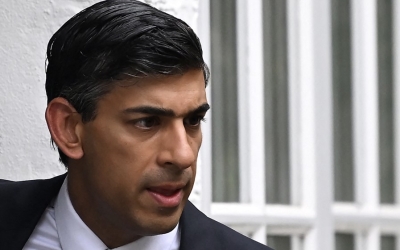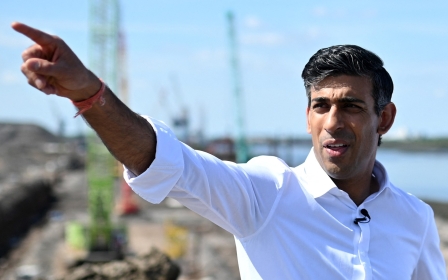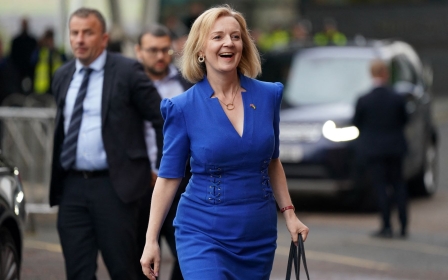UK: Conservative PM candidates back moving Israel embassy to Jerusalem

Prospective UK prime minister Rishi Sunak appears to have joined Conservative leadership rival Liz Truss in advocating the relocation of his country's Israel embassy to Jerusalem.
In a move that would reverse decades of British policy on Israel-Palestine, former chancellor Sunak told a hustings hosted by the Conservative Friends of Israel (CFI) that Jerusalem was Israel's "undisputed capital" and said there was a "very strong case" for relocating the UK embassy there.
"If I'm prime minister, I want to look at all these things with a fresh pair of eyes," he told the audience on Monday.
"Not much point in me doing the job if it's going to be the same old."
During the same event, Sunak also told the audience that he would commit to passing legislation that outlaws the Boycott, Divestment and Sanctions movement against Israel.
Citing his record from when he served as Local Government minister in 2018, Sunak proudly spoke of how the government passed policy that stopped investment policies that contradict British foreign and domestic policy, including BDS.
His comments come on the heels of a similar suggestion made by Truss, who is currently UK foreign secretary.
Truss is frontrunner in the contest to replace Boris Johnson as prime minister following a series of scandals that led to him announcing his resignation last month.
In a letter to the CFI, an influential advocacy group within the ruling party, Truss said that she was inclined to move the embassy to Jerusalem.
"I understand the importance and sensitivity of the location of the British Embassy in Israel," said Truss.
"I’ve had many conversations with my good friend Prime Minister [Yair] Lapid on this topic. Acknowledging that, I will review a move to ensure we are operating on the strongest footing within Israel."
Longstanding policy
The UK has long maintained its embassy in Tel Aviv, despite Israel claiming Jerusalem as its capital, as part of a longstanding policy that the city's final status should be decided following negotiations.
Israel conquered the eastern neighbourhoods of Jerusalem in 1967 and has annexed it in a move never recognised by the international community.
Palestinians have long claimed East Jerusalem as the capital of a future state.
In 2017, then-US president Donald Trump announced the transfer of his country's embassy to Jerusalem, a move that formally recognised Israel's sovereignty over the city.
A number of other countries, including Honduras and Guatemala, also followed suit. However, last week Honduras's new left-wing government suggested it might return its embassy to Tel Aviv, "with the aim of returning respect for the norms of international law demanded by the United Nations".
The vast majority of countries maintain their embassies in Tel Aviv and have called for Jerusalem's sovereignty to be decided through negotiations.
Middle East Eye delivers independent and unrivalled coverage and analysis of the Middle East, North Africa and beyond. To learn more about republishing this content and the associated fees, please fill out this form. More about MEE can be found here.





